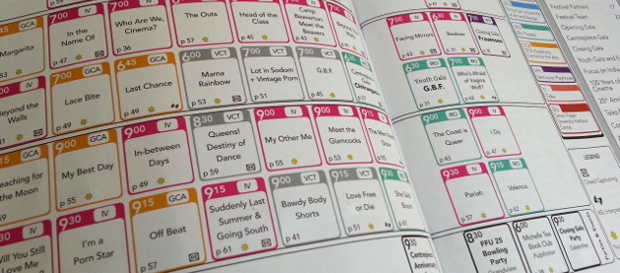Eleven days of queer culture, oh yeah!
Thursday, August 15
Not a lot of choice, right? There’s only the Opening Gala to go to.
Final choice: Magnificent Presence / Magnifica Presenza
Friday, August 16
Reaching for the Moon looks really good, but so does Will You Still Love Me Tomorrow?. Seeing Moon means I’ll have to see Margarita for the early show, which I’m not really feeling, because there’s no way I can get to SFU from International Village in time. Or… can I? No, probably not. I want to see Beyond the Walls, and though it’s also playing on Thursday, I’d have to miss the Centrepiece Gala which I really, really don’t want to do. Hmmm… Lesbian artistic drama, or comedy and karaoke? Decisions, decisions.
Final choice: Beyond the Walls / Hors les murs & Will You Still Love Me Tomorrow?
Saturday, August 17
Sadly I’ll only have time to see the early-early show, since I’ve got a barbecue to go to. On the bright side, from the trailer it looks like a great one! NOPE I’ll be at WordCamp Vancouver all day and then the BBQ. No movies for me!
Final choice: R/EVOLVE none
Sunday, August 18
A retrospective on Vancouver’s queer cinema scene vs. a hard-hitting documentary on queer refugees coming to Canada? That’s a tough one… For now I’m in a history kind of mood, though I reserve the right to change my mind later. I have no particular preference re: the late shows.
Final choice: Who Are We, Cinema? & In-between Days / Dui Dhuranir Golpo
Monday, August 19
To be honest, all this day’s movies look quite good. I could just flip a coin and I think I’d be happy. One the one hand, I could watch The Outs anytime… on the other hand, the creator will be present for discussion. On the gripping hand, I’d kind of rather see over-the-top Bollywood than sad Korean movies. Okay… for now, it’s heartwarming family stuff and Bollywood. Plus, those movies will end earlier, which is an important consideration.
Final choice: Mama Rainbow & Queens! A Destiny of Dance
Tuesday, August 20
Dammit, I really want to see Head of the Class, but I also really want to see some vintage silent porn with live musical accompaniment! Let’s see, what are the late shows? Hmmm… it’s either cosplay or sexy shorts… All right, I guess it’s a sexy evening for me!
Final choice: Lot in Sodom + Vintage Queer Porn & Bawdy Body Shorts
Wednesday, August 21
The VGVA is sponsoring Meet the Glamcocks, so I really should go. The other choice is the story of Bishop Gene Robinson, which to be honest doesn’t grab me all that much. Glamcocks it is, then! Since I’m at International Village, that leaves just one option for the early show. Fortunately it looks like a good one!
Final choice: Camp Beaverton & Meet the Glamcocks
Thursday, August 22
Centrepiece Gala! Bollywood! Oh yeah. And for the late show, the story of an all-female 80’s punk band? Sure, works for me.
Final choice: Chitrangada: The Crowning Wish & She Said Boom
Friday, August 23
I’m seeing The Coast is Queer, no question. So if I’m at the Rio, that means the early show is G.B.F. which looks like a lot of fun and hey, works out pretty well, since I’ll miss it on Wednesday!
Final choice: G.B.F. & The Coast is Queer
Saturday, August 24
I’ll miss In the Name of‘s first showing on the 17th (that darn BBQ), so here’s my second chance. Will I be able to make it down to the Rio in time for Who’s Afraid of Vagina Wolf? I hope so, I’m not really feeling Bwakaw. But I also have a slight preference for I Do over Valencia. Or I could pace myself and not see a third movie. But where’s the fun in that?
EDIT: the more I think about it, the more I’m leaning towards Bwakaw instead of Who’s Afraid of Vagina Wolf?. Plus I won’t need to schlep my ass across town, and I’ll get to see I Do. So here’s my updated schedule:
Final choice: In the Name of / W Imie & Bwakaw & I Do
Sunday, August 25
Again, only one movie to see!
Final choice: Frauensee
